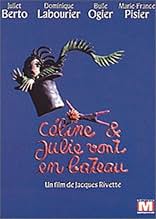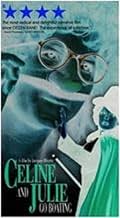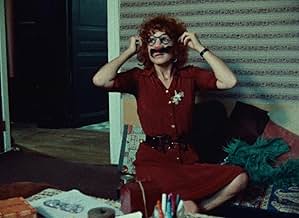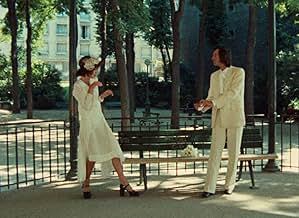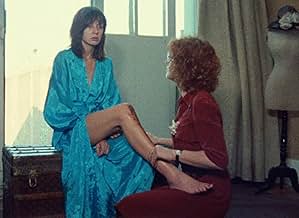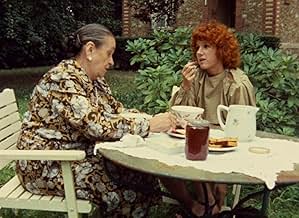Céline et Julie vont en bateau
Original title: Céline et Julie vont en bateau : Phantom Ladies Over Paris
- 1974
- Tous publics
- 3h 13m
IMDb RATING
7.2/10
6.8K
YOUR RATING
A mysteriously linked pair of young women find their daily lives preempted by a strange boudoir melodrama that plays itself out in a hallucinatory parallel reality.A mysteriously linked pair of young women find their daily lives preempted by a strange boudoir melodrama that plays itself out in a hallucinatory parallel reality.A mysteriously linked pair of young women find their daily lives preempted by a strange boudoir melodrama that plays itself out in a hallucinatory parallel reality.
- Awards
- 1 win total
Jean-Claude Biette
- Spectateur au cabaret
- (uncredited)
Jacques Bontemps
- Lecteur à la bibliothèque
- (uncredited)
Michel Caen
- Spectateur au cabaret
- (uncredited)
Featured reviews
10EdgarST
I saw "Céline et Julie vont en bateau" a few years after watching "3 Women" and Claudia Weill's "Girlfriends." The next day I saw it again, and then again and again... This was a time when I was very interested in the depiction of modern women in films: some were quite original and revealing, and this was indeed one of them, dealing with the creative process, and women's imagination. Made in 1974, it had a similar origin as that of "3 Women", in which the female cast (Juliet Berto, Dominique Labourier, Bulle Ogier, and Marie-France Pisier) worked with director Rivette and writer Eduardo de Gregorio on the script. It is also a story of female bonding and solidarity, but instead of relying on dreams, it uses magic and literary sources, Lewis Carroll's "Alice in Wonderland" being the first to come to mind. Librarian Julie (Labourier) becomes intrigued by weird rabbit-like magician Céline (Berto), but soon one is after the other. They become friends (or sort of) and exchange roles in each other's life, but nobody seems to notice the difference. Then Céline reveals she frequently goes inside an old house where a melodrama is repeated on and on (based on Henry James' "The Romance of Certain Old Clothes" and "The Other House"), enacted by two women (Ogier, Pisier) who are both in love with a very pale man (filmmaker Barbet Schroeder.) In the old house there is also a little girl (Nathalie Asnar) who is in danger, so Céline and Julie become the "phantom ladies" of the title (including Fantômas outfits) to rescue her. This post-modern movie is a puzzle, and the audience is intellectually involved in the making. Critics went crazy and called it "the most important film made since 'Citizen Kane'." I don't know if it is, but I love it: it is funny, demanding, entertaining, and sometimes boring, in the best tradition of Satie's repetitive "Vexations". Reworked as "Desperately Seeking Susan", without acknowledging it.
10ella-48
As a teenager in the 1970s, I was a frequent visitor to an art gallery in Liverpool called the Open Eye. When they started a film club, promising to show all the stuff I had read about but would never otherwise get a chance to see, I signed up like a flash.
It was a humble affair: a bare room with temporary blackouts on the windows, a makeshift screen at one end, a projector at t'other and a dozen or so ill-assorted chairs inbetween, but I loved it. For me it was a magic grotto: a portal to another place of endless fascination and discovery. It was here that I had my first exposure to the works of Buñuel, Renoir, Fritz Lang; Dziga Vertov's "Man With a Movie Camera"; the experimental shadowgraph animations of Man Ray; David Lynch's Eraserhead and, unforgettably, "Céline et Julie vont en bateau".
Even for one as keen on "Art" cinema as I was, Céline et Julie was a bit of a challenging prospect: a low-budget French thing about god-knows-what, by a director I'd never heard of, that we were warned would run over three hours without interval. Little did I know, as the opening credits rolled, that from then on time would mean nothing and I would be held captive; enthralled; the hours slipping by unheeded, as when dreaming.
It is this quality that, for me, makes this film so special. European (especially French) cinema is full of works that lay claim to the label "Surrealist". I have to say that in my opinion most of them have little to do with the truly surreal at all. More often than not they are simply a cocktail of absurdism and social satire.
Céline et Julie, on the other hand, is a genuinely surreal film possibly the ONLY genuinely surreal film ever made (!) - insomuch that its narrative (and hence the experience of watching it unfold) is uncannily dreamlike. From the outset the viewer is drawn inexorably forward by a teasing sense of curiosity. Frequently along the way there seems to be far too much going on that is unexplained, and little hope of fitting it all together, yet one cannot help but remain in the story. In time, we become aware that our mixed sensations as viewer are mirroring those being experienced by Céline and Julie and thus we find ourselves in that familiar condition of the dreamer: of being simultaneously both onlooker and protagonist in our own drama.
Afterwards, I was left feeling curiously elated, yet struggling to recall its details with any precision. The impressions it had left behind were powerful and thought-provoking, yet intangible, and recalled but imperfectly, in the manner of one who has just awoken: with a frustrating uncertainty as to exactly what had occurred, to whom and in what order. Any attempt to explain it to a third party was equally doomed. Just as with a half-remembered dream, the very act of telling caused the peculiar para-logic of the narrative to disintegrate, and I'd be left speechless.
It's been part of me ever since. Over the last 30-odd years, the themes and images of this film have, in the nicest possible way, haunted me: lurking in the shadows of consciousness, beyond the clumsy reach of rational query, quietly informing my imagination, to appear, unbidden, in subtle and unexpected ways in my own creative output.
The whole strange business has been made all the more uncanny by the fact that, throughout those 30-odd years, the film itself has been lost to me. Having experienced it the once, I was never able to find Céline et Julie again, nor any reference to it, even in the pages of famously trusted and supposedly 'comprehensive' movie guides. Likewise, whenever I mentioned the film in conversation I could never come across anyone who had ever heard of it. Having worked its mischief, the contrary creature had melted back into the half-light, leaving no trace of its existence.
Then, in October of 2006, a miracle: there it was, right in front of me, listed in the TV schedules! Film4 was showing it at the suitably unconscious hour of 3am. Unwilling to risk losing it for another 30 years to the vagaries of my video recorder's dodgy timer, I sat up, my finger hovering nervously over the Record button...
A few days later, having found an afternoon in which we were free of commitments, my partner and I settled in to watch it: she with some scepticism that she would be able to maintain her interest for the whole 3 hours, and me both a-quiver with anticipation and privately praying that, in the hard light of reality, this thing of treasured half-memory would not prove itself to be The Worst Load Of Pretentious Tripe Ever Made.
I needn't have worried. No sooner had I hit "Play" than that fragrant, familiar magic began weaving itself all over again. I am delighted to report that Céline et Julie is just as powerful an experience now as it was in my youth.
What I had forgotten, or perhaps never noticed at all on first viewing, was just what a rough-edged, homespun creature it is in technical terms. It was shot entirely on location, on 16mm and with a very small crew, and it shows. The soundtrack is patchy in places and frequently prey to whatever ambient sounds were present when the camera rolled (usually Parisian traffic noise). Now and then the acting is self-conscious, and some of the reaction shots are clumsily done. In the end, though, none of this matters a damn. Indeed, it is the film's very lack of studio polish that gives it much of its special flavour. Céline et Julie is an imperfect creation, but an honest one. It is also charming, playful and frequently hilarious. As such, I recommend it unreservedly.
It was a humble affair: a bare room with temporary blackouts on the windows, a makeshift screen at one end, a projector at t'other and a dozen or so ill-assorted chairs inbetween, but I loved it. For me it was a magic grotto: a portal to another place of endless fascination and discovery. It was here that I had my first exposure to the works of Buñuel, Renoir, Fritz Lang; Dziga Vertov's "Man With a Movie Camera"; the experimental shadowgraph animations of Man Ray; David Lynch's Eraserhead and, unforgettably, "Céline et Julie vont en bateau".
Even for one as keen on "Art" cinema as I was, Céline et Julie was a bit of a challenging prospect: a low-budget French thing about god-knows-what, by a director I'd never heard of, that we were warned would run over three hours without interval. Little did I know, as the opening credits rolled, that from then on time would mean nothing and I would be held captive; enthralled; the hours slipping by unheeded, as when dreaming.
It is this quality that, for me, makes this film so special. European (especially French) cinema is full of works that lay claim to the label "Surrealist". I have to say that in my opinion most of them have little to do with the truly surreal at all. More often than not they are simply a cocktail of absurdism and social satire.
Céline et Julie, on the other hand, is a genuinely surreal film possibly the ONLY genuinely surreal film ever made (!) - insomuch that its narrative (and hence the experience of watching it unfold) is uncannily dreamlike. From the outset the viewer is drawn inexorably forward by a teasing sense of curiosity. Frequently along the way there seems to be far too much going on that is unexplained, and little hope of fitting it all together, yet one cannot help but remain in the story. In time, we become aware that our mixed sensations as viewer are mirroring those being experienced by Céline and Julie and thus we find ourselves in that familiar condition of the dreamer: of being simultaneously both onlooker and protagonist in our own drama.
Afterwards, I was left feeling curiously elated, yet struggling to recall its details with any precision. The impressions it had left behind were powerful and thought-provoking, yet intangible, and recalled but imperfectly, in the manner of one who has just awoken: with a frustrating uncertainty as to exactly what had occurred, to whom and in what order. Any attempt to explain it to a third party was equally doomed. Just as with a half-remembered dream, the very act of telling caused the peculiar para-logic of the narrative to disintegrate, and I'd be left speechless.
It's been part of me ever since. Over the last 30-odd years, the themes and images of this film have, in the nicest possible way, haunted me: lurking in the shadows of consciousness, beyond the clumsy reach of rational query, quietly informing my imagination, to appear, unbidden, in subtle and unexpected ways in my own creative output.
The whole strange business has been made all the more uncanny by the fact that, throughout those 30-odd years, the film itself has been lost to me. Having experienced it the once, I was never able to find Céline et Julie again, nor any reference to it, even in the pages of famously trusted and supposedly 'comprehensive' movie guides. Likewise, whenever I mentioned the film in conversation I could never come across anyone who had ever heard of it. Having worked its mischief, the contrary creature had melted back into the half-light, leaving no trace of its existence.
Then, in October of 2006, a miracle: there it was, right in front of me, listed in the TV schedules! Film4 was showing it at the suitably unconscious hour of 3am. Unwilling to risk losing it for another 30 years to the vagaries of my video recorder's dodgy timer, I sat up, my finger hovering nervously over the Record button...
A few days later, having found an afternoon in which we were free of commitments, my partner and I settled in to watch it: she with some scepticism that she would be able to maintain her interest for the whole 3 hours, and me both a-quiver with anticipation and privately praying that, in the hard light of reality, this thing of treasured half-memory would not prove itself to be The Worst Load Of Pretentious Tripe Ever Made.
I needn't have worried. No sooner had I hit "Play" than that fragrant, familiar magic began weaving itself all over again. I am delighted to report that Céline et Julie is just as powerful an experience now as it was in my youth.
What I had forgotten, or perhaps never noticed at all on first viewing, was just what a rough-edged, homespun creature it is in technical terms. It was shot entirely on location, on 16mm and with a very small crew, and it shows. The soundtrack is patchy in places and frequently prey to whatever ambient sounds were present when the camera rolled (usually Parisian traffic noise). Now and then the acting is self-conscious, and some of the reaction shots are clumsily done. In the end, though, none of this matters a damn. Indeed, it is the film's very lack of studio polish that gives it much of its special flavour. Céline et Julie is an imperfect creation, but an honest one. It is also charming, playful and frequently hilarious. As such, I recommend it unreservedly.
Some directors use less than 2% of their footage in the final cut but Rivette must have used 92% of his to make this - perhaps he used absolutely everything, including, apparently, out-takes. Tedium sometimes has a point, but not here. This is annoying-tedium for every scene seems calculated to test our patience. There's no humour or verve or flair or great lines or classic scenes, not even sad attempts at those things, only a forced drollerie that falls flat in every scene There is endless silly giggling, scenes such as those in the nightclub that are just tiresome to watch, fantasy sequences that are presumably meant to look like a corny TV sitcom, but, lacking any scrap of humour, the point is entirely lost and the actors flounder. The girls try far too hard to be cute, and only succeed in being cloying. And I'm waiting for a director to grasp this simple truth: that giving the actors free rein does not make the action more spontaneous and natural, only more strangulated, more self-conscious, more unnatural and cringe-inducing than if they were following a consistent and meticulous script.
After a while you realise Rivette is just playing silly buggers. Fluffed lines are left in, characters glance inadvertently-deliberately at the camera. Rivette will be saying: 'Regard, c'est un film that is pas un film, we're deliberatement toying avec your illusions'. I'm saying: Vous etes un wankeur.
Why three hours? A Senses of Cinema article is eager to explain: 'The tradition of rigid adherence to the 90 minute to 2-hour time frame, enforced by the laws of free market capitalism, is exploded by Rivette. As a filmmaker, Rivette refuses to confine himself to these arbitrary lengths, or to the even more arbitrary, if unspoken, rules about demands on subject matter and mise-en-scène in films of epic length. Instead, Rivette extends the lengths of his films to a point beyond necessity, where it is understood that the film's length in and of itself is a statement about the system he works in and rebels against.' 3 hours simply to defy (capitalistic??) convention? Wankeur.
The audience are the dupes here - poked fun at for trying to apply reality to what is self-consciously only a film. This is not New Wave. I'm gazetting Rivette as a hanger-on, a copyist. He wants to shoot in the style of Rohmer, but he hasn't got Rohmer's indefinable deftness. He wants to break the rules like Godard but he has not got Godard's indefinable style or charisma. He wants to say something meaningful in an offhand way, like Truffaut, but he hasn't got that indefinable intellect for it. All he can do is try. You can feel him trying. It boils down to a single lame joke that isn't funny and a single idea that isn't clever. Three hours of film-flam, tiresome beyond belief.
After a while you realise Rivette is just playing silly buggers. Fluffed lines are left in, characters glance inadvertently-deliberately at the camera. Rivette will be saying: 'Regard, c'est un film that is pas un film, we're deliberatement toying avec your illusions'. I'm saying: Vous etes un wankeur.
Why three hours? A Senses of Cinema article is eager to explain: 'The tradition of rigid adherence to the 90 minute to 2-hour time frame, enforced by the laws of free market capitalism, is exploded by Rivette. As a filmmaker, Rivette refuses to confine himself to these arbitrary lengths, or to the even more arbitrary, if unspoken, rules about demands on subject matter and mise-en-scène in films of epic length. Instead, Rivette extends the lengths of his films to a point beyond necessity, where it is understood that the film's length in and of itself is a statement about the system he works in and rebels against.' 3 hours simply to defy (capitalistic??) convention? Wankeur.
The audience are the dupes here - poked fun at for trying to apply reality to what is self-consciously only a film. This is not New Wave. I'm gazetting Rivette as a hanger-on, a copyist. He wants to shoot in the style of Rohmer, but he hasn't got Rohmer's indefinable deftness. He wants to break the rules like Godard but he has not got Godard's indefinable style or charisma. He wants to say something meaningful in an offhand way, like Truffaut, but he hasn't got that indefinable intellect for it. All he can do is try. You can feel him trying. It boils down to a single lame joke that isn't funny and a single idea that isn't clever. Three hours of film-flam, tiresome beyond belief.
A PERFECT, SHARED IMAGINATION: something we become entirely incapable of evoking in our adult lives. As children, it's still possible to create an all-engrossing, parallel existence played out in symbiotic harmony by two individuals calling themselves best friends. With an uncluttered and unfettered creativity, these friends are sucked into their inner story to a point that time, place and the mundane habits and duties of one's routine no longer exist, or rather, are incorporated and/or adapted to fit what then becomes one's main existence - the imagined one. What makes this movie so convincingly evoke the yearning for the magic of childhood is exactly this: the fact that this imaginative world is shared so perfectly by two friends, and not just cultivated within an isolation and individuality typical of adult age. No other movie has made me think back at my childhood best friends as vividly as Céline and Julie Go Boating!
Hours spent in a room surrounded by familiar objects turned into so many powerful talismans. Earnest "magic" rituals punctuated by benevolent, mutual derision in the little moments in which one risks getting too serious or devoid of irony. Convulsive giggling fits which end in snorting noises. Relaxed, spontaneous, touchy-feely languid poses making two friends feel like they fit each other's company like a glove. Living the present so perfectly that one is momentarily, blissfully freed of any baggage from the past or the insecurities for the future that stunt one's spontaneity in the present. This isn't just a definition of perfect, child-like friendship, but also of a simple, uncluttered state of pure happiness. Rivette captures the spirit of all these things - childhood and happiness - in a movie unlike any I've seen before. Or rather - the movie may have seemed familiar thematically, but the execution and spirit of it was something else altogether.
As other users have commented here, Céline and Julie Go Boating is inspired by both Alice's Adventures in Wonderland and Henry James, as well as being reminiscent of Buñuel - not just his "surreal" movies but also That Obscure Object of Desire. In the latter, Carole Bouquet and Angela Molina play the same character interchangeably. Céline and Julie do the same when they both, interchangeably play the nurse in the closed-circuit, story-in-the-story involving the man, the blonde woman, the brunette woman and the little girl in the "haunted" house - this story's plot is being played out over and over again in the two protagonists' heads as they strive to both figure its intrigue and the dark heart of its mystery out, all the while deriding the stuffy rhetoric of its melodrama (delightful!). There are clear echoes of Bergman's Persona as well, as Céline and Julie stand in for each other - namely, Céline pretends to be Julie when she meets her childhood sweetheart and cousin Guilou, while Julie stands in for Céline when she attends the magician's audition. Touches of Buñuel and Fellini are also evoked by the dream sequences, with their typical, fragmented rhythm which mixes in dreams, reality, thoughts and imagination. Though innovative and timeless, Céline and Julie Go Boating does also belong to the decade in which it was made, as it has a recognisable 1960s/70s surrealist aesthetic and an interest in "inner landscapes", not for their own sake but for what they say about the psychic goings on of human beings.
Purely thematically, this movie also brought to mind Peter Jackson's 1994 movie Heavenly Creatures. However, though the latter was made exactly 20 years later than Céline and Julie, it is decidedly more "misogynistic" in spirit, to be fair perhaps not consciously or intentionally so. Why am I calling Jackson's movie misogynistic? Because ultimately, unlike Céline and Julie Go Boating, it treats the symbiotic, shared, female imagination that's allowed free rein as something negatively irrational, uncontrollable, dark and finally, destructive, the lesbian undertones becoming morbid rather than light-hearted, humorous and feel-good as in the Rivette's splendid and highly original movie.
What this Céline and Julie Go Boating told me was that in some cases, guiltlessly cultivating, salvaging and exploring one's inner and imaginative life is far more important than meeting the expectations of one's day-to-day, material duties. Therefore, solving the mystery of a "haunted" house is more crucial than, say, furthering one's career (for example, succeeding in an audition for an important, international magician's tour - Céline should have attended it but Julie does so instead, to very amusing and disastrous effect! I loved, loved, loved actress Dominique Labourier's droll histrionics during that scene!).
I have never seen a movie treat with such humour and gaiety a subject as serious, complex and potentially heavy-duty Freudian as exploring one's unresolved childhood issues. Much of this movie is about Julie's (and perhaps everyone's, to a degree) inability to assimilate the past completely (her tarot reading by a fellow librarian reveals this at the beginning of the movie - "Your future is in the past"). To put it stereotypically, the "inner child" needs to be freed before one can truly become an adult - a happy, healthy, sorted, serene, childlike adult. This process of healing is punctuated by the two protagonists by playful role-playing (both Céline and Julie have a ball taking on different identities by also donning different costumes throughout the course of the movie), an endless string of occasions for giggling fits and what is essentially a cheerful use of childish "drugs" (candy and home-made magic potions) to evoke that crucial, life-giving shared imagination. In a sentence, the psychic ailments typical of adulthood are cured with the spirit typical of childhood.
Hours spent in a room surrounded by familiar objects turned into so many powerful talismans. Earnest "magic" rituals punctuated by benevolent, mutual derision in the little moments in which one risks getting too serious or devoid of irony. Convulsive giggling fits which end in snorting noises. Relaxed, spontaneous, touchy-feely languid poses making two friends feel like they fit each other's company like a glove. Living the present so perfectly that one is momentarily, blissfully freed of any baggage from the past or the insecurities for the future that stunt one's spontaneity in the present. This isn't just a definition of perfect, child-like friendship, but also of a simple, uncluttered state of pure happiness. Rivette captures the spirit of all these things - childhood and happiness - in a movie unlike any I've seen before. Or rather - the movie may have seemed familiar thematically, but the execution and spirit of it was something else altogether.
As other users have commented here, Céline and Julie Go Boating is inspired by both Alice's Adventures in Wonderland and Henry James, as well as being reminiscent of Buñuel - not just his "surreal" movies but also That Obscure Object of Desire. In the latter, Carole Bouquet and Angela Molina play the same character interchangeably. Céline and Julie do the same when they both, interchangeably play the nurse in the closed-circuit, story-in-the-story involving the man, the blonde woman, the brunette woman and the little girl in the "haunted" house - this story's plot is being played out over and over again in the two protagonists' heads as they strive to both figure its intrigue and the dark heart of its mystery out, all the while deriding the stuffy rhetoric of its melodrama (delightful!). There are clear echoes of Bergman's Persona as well, as Céline and Julie stand in for each other - namely, Céline pretends to be Julie when she meets her childhood sweetheart and cousin Guilou, while Julie stands in for Céline when she attends the magician's audition. Touches of Buñuel and Fellini are also evoked by the dream sequences, with their typical, fragmented rhythm which mixes in dreams, reality, thoughts and imagination. Though innovative and timeless, Céline and Julie Go Boating does also belong to the decade in which it was made, as it has a recognisable 1960s/70s surrealist aesthetic and an interest in "inner landscapes", not for their own sake but for what they say about the psychic goings on of human beings.
Purely thematically, this movie also brought to mind Peter Jackson's 1994 movie Heavenly Creatures. However, though the latter was made exactly 20 years later than Céline and Julie, it is decidedly more "misogynistic" in spirit, to be fair perhaps not consciously or intentionally so. Why am I calling Jackson's movie misogynistic? Because ultimately, unlike Céline and Julie Go Boating, it treats the symbiotic, shared, female imagination that's allowed free rein as something negatively irrational, uncontrollable, dark and finally, destructive, the lesbian undertones becoming morbid rather than light-hearted, humorous and feel-good as in the Rivette's splendid and highly original movie.
What this Céline and Julie Go Boating told me was that in some cases, guiltlessly cultivating, salvaging and exploring one's inner and imaginative life is far more important than meeting the expectations of one's day-to-day, material duties. Therefore, solving the mystery of a "haunted" house is more crucial than, say, furthering one's career (for example, succeeding in an audition for an important, international magician's tour - Céline should have attended it but Julie does so instead, to very amusing and disastrous effect! I loved, loved, loved actress Dominique Labourier's droll histrionics during that scene!).
I have never seen a movie treat with such humour and gaiety a subject as serious, complex and potentially heavy-duty Freudian as exploring one's unresolved childhood issues. Much of this movie is about Julie's (and perhaps everyone's, to a degree) inability to assimilate the past completely (her tarot reading by a fellow librarian reveals this at the beginning of the movie - "Your future is in the past"). To put it stereotypically, the "inner child" needs to be freed before one can truly become an adult - a happy, healthy, sorted, serene, childlike adult. This process of healing is punctuated by the two protagonists by playful role-playing (both Céline and Julie have a ball taking on different identities by also donning different costumes throughout the course of the movie), an endless string of occasions for giggling fits and what is essentially a cheerful use of childish "drugs" (candy and home-made magic potions) to evoke that crucial, life-giving shared imagination. In a sentence, the psychic ailments typical of adulthood are cured with the spirit typical of childhood.
10Corwin-3
Movies would seem to be the ideal medium for surrealism, yet there are almost no good surrealist movies. There is the venerable "Un Chien Andalou", and there is "Celine et Julie vont en Bateau", and that might well be the lot. "Celine et Julie" has been one of my favorite films since I first saw it in the 1970s, because it is hypnotic, thought-provoking, mysterious, and funny, all at once. Its overall style could be described as magical realism, in which the quotidian life of Paris serves as a mere background for the magical fantasy life of the protagonists, two young women on a psychic journey, which may or may not end in madness ("vont en bateau", which literally means "go boating", is also slang for "go crazy").
The film is made of moments that seem to happen outside of time. In fact, the passage of time, the succession of events in everyday life, becomes an intrusion on the increasingly shared inner life of the two women, and each takes (hilarious) action to prevent those intrusions from continuing. They determine, in effect, that they must return as adults to their childhood in order to change the past. This may sound like a boring Freudian nightmare, but there is no heavy-handed psychologizing in the movie; it is all play, lighthearted yet beautifully composed. The sound-track is particularly effective, almost hyperrealistic, with no background music. The click of heels on pavement, or the motor of a taxi, loom out of the silence as in a dream, which the movie may be, at its heart.
I give this one a 10. You probably know already whether you would like it. If so, see it in a theater if you can, and on video if you must, but don't miss it.
The film is made of moments that seem to happen outside of time. In fact, the passage of time, the succession of events in everyday life, becomes an intrusion on the increasingly shared inner life of the two women, and each takes (hilarious) action to prevent those intrusions from continuing. They determine, in effect, that they must return as adults to their childhood in order to change the past. This may sound like a boring Freudian nightmare, but there is no heavy-handed psychologizing in the movie; it is all play, lighthearted yet beautifully composed. The sound-track is particularly effective, almost hyperrealistic, with no background music. The click of heels on pavement, or the motor of a taxi, loom out of the silence as in a dream, which the movie may be, at its heart.
I give this one a 10. You probably know already whether you would like it. If so, see it in a theater if you can, and on video if you must, but don't miss it.
Did you know
- TriviaIt is a misconception that most of the film was improvised by the actors. Jacques Rivette provided structure but did not let his actors "go wild", instead he let them write. A single scene was improvised, where Celine, played by Julie Berto, brags to her associates about her rich American friend. The rest of the scenes where shot from scripted material, mostly thanks to participating actors. The film is collaboration by several authors, including actors Berto, Labourier, Ogier and Pisier. Rivette's involvement in the writing was to give structure to all the contributions, tightening things up.
- GoofsThe last time Julie receives the cigarette from under the table, it is bigger than it was when her colleague handed it to her.
- ConnectionsFeatured in Berlin Chamissoplatz (1980)
- How long is Celine and Julie Go Boating?Powered by Alexa
Details
Box office
- Gross US & Canada
- $31,452
- Opening weekend US & Canada
- $5,624
- May 6, 2012
- Gross worldwide
- $31,452
- Runtime3 hours 13 minutes
- Sound mix
- Aspect ratio
- 1.37 : 1
Contribute to this page
Suggest an edit or add missing content


